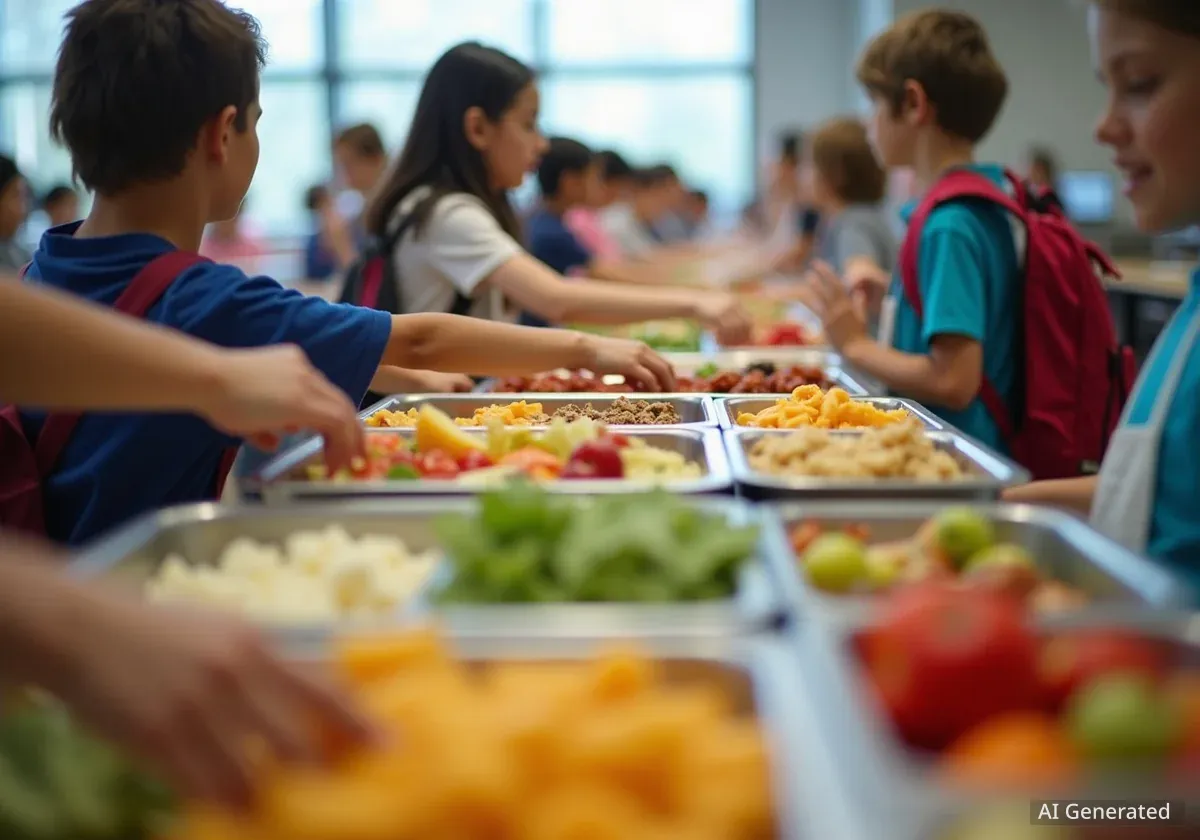California has enacted a new law that will gradually remove ultra-processed foods from all public schools across the state. Governor Gavin Newsom signed Assembly Bill 1264 into law, setting a deadline of July 2032 for the complete phase-out of these food items from school cafeterias and vending machines.
The legislation, authored by Assemblymember Jesse Gabriel, establishes a clear definition for what constitutes an ultra-processed food and represents a significant step in shaping student nutrition standards. The move has garnered support from both political parties and aligns with a growing national focus on food quality and public health.
Key Takeaways
- California will phase out ultra-processed foods from schools, with a full ban taking effect by July 2032.
- The new law defines ultra-processed foods as those with certain additives, high levels of saturated fat, sodium, or added sugars.
- Authored by Assemblymember Jesse Gabriel, the bill received bipartisan support.
- This legislation follows previous California laws banning specific food dyes and chemicals in schools.
Defining New Nutritional Standards
Under the newly signed law, California will establish a specific definition for ultra-processed foods served in schools. The criteria will target food and beverage products that contain certain flavor or color enhancers. Additionally, items high in saturated fats, sodium, or particular added sugars and sweeteners will fall under this category.
This initiative, known as Assembly Bill 1264, creates a long-term plan for school districts. The nearly decade-long transition period is designed to give schools, suppliers, and food service providers ample time to adjust their menus and supply chains to meet the new requirements.
The goal is to replace these items with healthier, minimally processed alternatives, aiming to improve the overall diet and long-term health outcomes for millions of students.
A Pattern of Food Safety Legislation
This is not the first time California has targeted specific food ingredients. Governor Newsom previously signed legislation from Assemblymember Gabriel that banned foods containing certain dyes from being sold in schools by 2027. Another law will prohibit the sale of foods with chemicals like Red 40 anywhere in the state, also by 2027.
Bipartisan Backing for Healthier Schools
During a bill-signing ceremony at a middle school in Los Angeles, Governor Newsom highlighted the broad political support for the measure. He noted that the initiative to improve student health should be a unifying issue.
"[This] should unite all of us, regardless of political stripes," Newsom stated, emphasizing the non-partisan nature of promoting better nutrition for children.
While the bill found common ground, Newsom also connected it to the larger, often contentious, national debate on healthcare. He argued that addressing poor nutrition is a crucial component of preventative medicine.
"It’s just not good enough to make a case against ultraprocessed foods unless you’re making a case for healthcare delivery systems, for preventative care," the governor added, framing the law as a proactive public health strategy.
What is an Ultra-Processed Food?
While definitions can vary, ultra-processed foods are typically industrial formulations made from substances extracted from foods or synthesized in labs. They often contain additives like artificial colors, flavors, and emulsifiers to enhance taste and shelf life. Examples can include packaged snacks, sugary drinks, and pre-prepared meals.
California's Role in a National Movement
The push to define and regulate ultra-processed foods is not limited to California. At the federal level, agencies including the U.S. Department of Agriculture (USDA), Health and Human Services (HHS), and the Food and Drug Administration (FDA) are collaborating to create a government-wide definition. This effort is intended to support future research and policy decisions on a national scale.
The national conversation has been influenced by movements like Robert F. Kennedy Jr.’s "Make America Healthy Again" (MAHA) agenda, which has drawn attention to the prevalence of chronic diseases linked to diet.
State-Level Action on Nutrition
According to a POLITICO analysis, the focus on nutrition is widespread. Over 130 bills related to ultra-processed foods or nutrition were introduced in state legislatures this year. States such as New York and New Jersey have been particularly active in proposing legislation aligned with these health-focused goals.
Assemblymember Jesse Gabriel, the bill's author, emphasized that his work on this issue began before the recent surge in national attention. He stressed California's commitment to a science-based approach.
"I think we have found an approach here in California that works for us, which has been bipartisan, common sense, science based," Gabriel told POLITICO. "We’ve seen how that has actually influenced policy in Washington. We’ve seen how it’s influenced policy in other states, and so we’re happy to keep doing that."
By implementing this law, California positions itself as a leader in school nutrition policy. Proponents hope the state's actions will serve as a model for others considering similar measures to improve the health and well-being of students nationwide.





